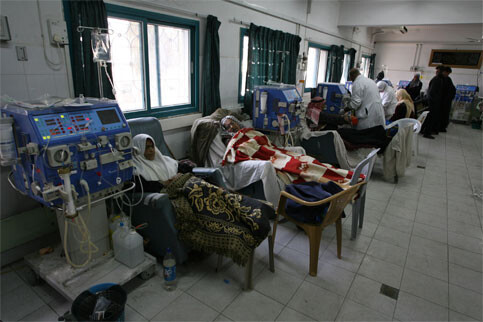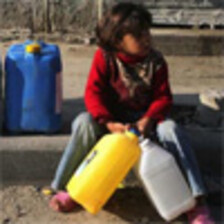The Electronic Intifada 29 January 2008

Dialysis patients get treatment in al-Shifa hospital, Gaza. Their lives depend on electricity being available. (Wissam Nassar/IRIN)
JERUSALEM, 28 January (IRIN) - The Israeli-imposed restrictions on imports to the Gaza Strip are threatening the lives of vulnerable patients, the Oxfam aid agency has said.
“Oxfam International is gravely concerned about the life and safety of the civilian population residing in the Gaza Strip,” Oxfam’s director said in a statement on 25 January.
“In Shifa hospital in Gaza city, 135 cancer patients are currently unable to receive treatment due to the lack of basic medications,” Oxfam said.
The problem is attributable largely to seven months of blockade since Hamas took over in the enclave but last week’s complete lock-down of Gaza exacerbated the situation, and the Rafah border break-out has not fundamentally changed the situation.
Israeli Defense Minister Ehud Barak has said “the policy of the closed crossings to Gaza will continue except for transferring small amounts of fuel and humanitarian equipment,” the Israeli daily Haaretz reported.
When the Rafah border was breached, one of the items people bought was medicines, though the amount purchased does not solve the overall problem.
The World Health Organization has reported a shortage of at least 88 drugs and 204 essential medical consumables in the Gaza Strip. WHO has called for the lifting of restrictions on medicine imports and patient movements, and said it was concerned by power cuts.
Fuel imports
Israel has begun to let in industrial fuel for Gaza’s power plant, and the state prosecutor informed the High Court on 27 January that import levels would be raised to those prior to the increased restrictions implemented in October, but officials in Gaza have warned that this is not enough.
Prior to being declared by Israel a “hostile entity,” the Strip imported 2.2 million liters of industrial fuel a week. However, increased winter needs, combined with the fact that in December the plant obtained a third turbine, mean the actual levels required are 3.5 million liters a week, power plant officials said.
Power outages are still being felt in all parts of the enclave, though mostly in the central region.
Gisha, one of the Israeli human rights organizations involved in the High Court appeal, has said there is a 30 percent drop in the water supply due to the power and fuel cuts, and the Coastal Municipalities Water Utility (CMWU) has been forced to dump daily some 40,000 cubic meters of raw sewage into the sea, said Gisha, quoting CMWU’s Monther Shublak.
Also, there remains no commitment that Israel will not cut fuel imports again, if, for example, rocket attacks against Israel increase.
The power cuts are affecting hospitals and health clinics, forcing them to rely on generators for many hours each day.
“We use generators at least six hours every day,” Jamal Hawajri from the Union of Health Workers’ Committees, a local health non-governmental organization in Gaza city, told IRIN. “This is costing us extra money, while we still can’t operate at full capacity and have to cancel elective surgeries.”
Protest
On 26 January about 1,500 Israelis — both Arabs and Jews — made their way to the Erez Crossing with Gaza to protest against the blockade, bringing with them several tons of food aid, as well as water filters.
At the end of the protest, Shir Shudzik, a 17-year-old girl from Sderot, stood up to express solidarity with the Gazans, while telling the crowd of her life since the rocket attacks began six years ago. Her aunt and cousin were injured by a projectile from Gaza, but she said she had hope that Jewish-Arab solidarity would bring peace to the civilians on both sides.
This item comes to you via IRIN, a UN humanitarian news and information service, but may not necessarily reflect the views of the United Nations or its agencies. All IRIN material may be reposted or reprinted free-of-charge; refer to the copyright page for conditions of use. IRIN is a project of the UN Office for the Coordination of Humanitarian Affairs.
Related Links


